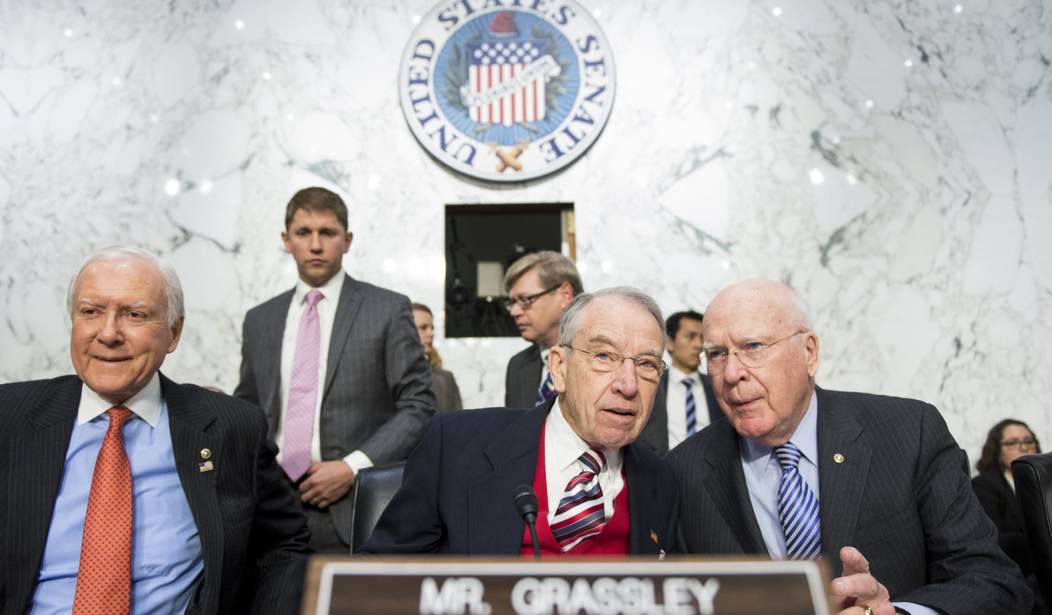The top Democrat on the Senate Judiciary Committee said today that late Supreme Court Justice Antonin Scalia would want the Senate to confirm his replacement as soon as possible.
“I think we ought to talk about this, the Constitution of the United States. The Constitution of the United States says the president shall nominate justices to the Supreme Court and then the Senate will vote, advise, and consent,” Sen. Pat Leahy (D-Vt.) told MSNBC today. ” It would be the height of irresponsibility for the Republican leadership not to have a vote on a nominee from the president.”
“We have had numerous times in our history that there’s been a confirmation of a justice in the final year of a presidency. Most recently, when President Reagan, the Democrats were in charge, President Reagan’s nominee was voted on in the last year of his presidency. And we kept it out of politics. I believe it went through unanimously.”
Justice Anthony Kennedy was nominated to the high court in November 1987 and confirmed 97-0 in February 1988.
“If the Democrats had run the kind of attitude that the Republicans are, he never would have had a vote,” Leahy argued. “Instead we voted him through unanimously.”
He suggested that Senate Republicans cancel some recess time this year to push through a nominee.
“What kind of impression do you think we are giving to the rest of the world when our federal judiciary, which is usually held up as the gold standard for the whole world, is suddenly thrust into such politics?” Leahy continued. “I can’t say, I don’t think the late Justice Scalia would want to see that. It is wrong. It is not responsible. It’s beneath our country. It’s beneath the United States Senate.”
Democrats are hoping to get a nominee through the Judiciary Committee to a floor vote, where they would heap pressure on senators in tight re-election contests to get over the 60-vote threshold.
But one of those targeted senators, Rob Portman (R-Ohio), who’s facing a November challenge from former Ohio Gov. Ted Strickland, said in a statement today that “the best thing for the country is to trust the American people to weigh in on who should make a lifetime appointment that could reshape the Supreme Court for generations.”
“This wouldn’t be unusual. It is common practice for the Senate to stop acting on lifetime appointments during the last year of a presidential term, and it’s been nearly 80 years since any president was permitted to immediately fill a vacancy that arose in a presidential election year,” Portman said. “I have supported some of President Obama’s federal court nominees and opposed others, based on their qualifications. Whether the next president is a Republican or Democrat, I will judge any nominee on the merits, as I always have.”
And Judiciary Committee Chairman Chuck Grassley (R-Iowa), who would be tasked with bringing any nominee up for a hearing, stressed in a Saturday statement that “the fact of the matter is that it’s been standard practice over the last nearly 80 years that Supreme Court nominees are not nominated and confirmed during a presidential election year.”
“Given the huge divide in the country, and the fact that this president, above all others, has made no bones about his goal to use the courts to circumvent Congress and push through his own agenda, it only makes sense that we defer to the American people who will elect a new president to select the next Supreme Court Justice,” Grassley said.
Sen. Dianne Feinstein (D-Calif.), who sits on the Judiciary Committee and said she “admired and respected” Scalia’s “love for the Constitution,” said delaying a nomination would “leave our country in a precarious position.”
“There are important cases pending before the Court, and the prospect of 4-4 decisions is not in the public interest and does a profound disservice to the notions of swift and equal justice in this country,” Feinstein said.









Join the conversation as a VIP Member